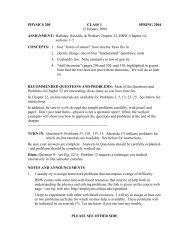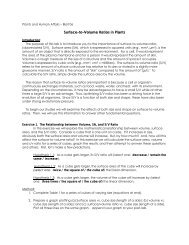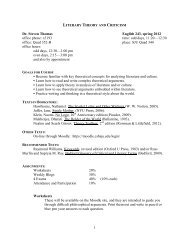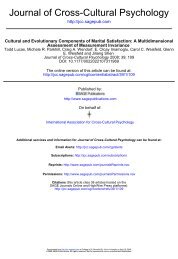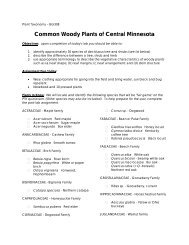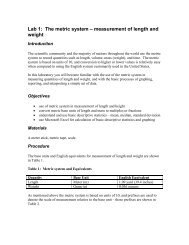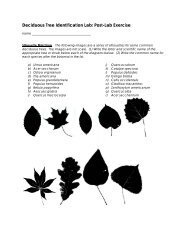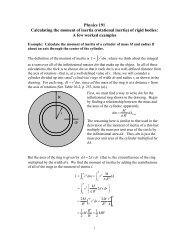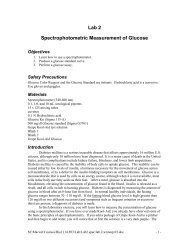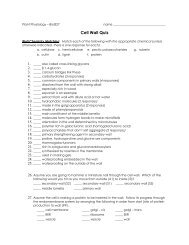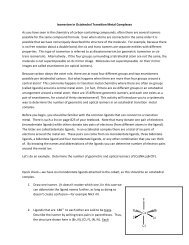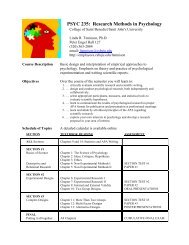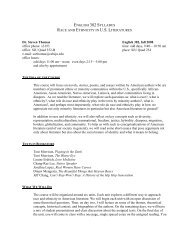Karl Marx Economic and Philosophical Manuscripts of 1844 Wages ...
Karl Marx Economic and Philosophical Manuscripts of 1844 Wages ...
Karl Marx Economic and Philosophical Manuscripts of 1844 Wages ...
You also want an ePaper? Increase the reach of your titles
YUMPU automatically turns print PDFs into web optimized ePapers that Google loves.
45Estranged LaborWe have started out from the premises <strong>of</strong> political economy.We have accepted its language <strong>and</strong> its laws. We presupposedprivate property; the separation <strong>of</strong> labor, capital, <strong>and</strong> l<strong>and</strong>, <strong>and</strong>likewise <strong>of</strong> wages, pr<strong>of</strong>it, <strong>and</strong> capital; the division <strong>of</strong> labor;competition; the conception <strong>of</strong> exchange value, etc. From politicaleconomy itself, using its own words, we have shown that theworker sinks to the level <strong>of</strong> a commodity, <strong>and</strong> moreover the mostwretched commodity <strong>of</strong> all; that the misery <strong>of</strong> the worker is ininverse proportion to the power <strong>and</strong> volume <strong>of</strong> his production; thatthe necessary consequence <strong>of</strong> competition is the accumulation <strong>of</strong>capital in a few h<strong>and</strong>s <strong>and</strong> hence the restoration <strong>of</strong> monopoly in amore terrible form; <strong>and</strong> that, finally, the distinction betweencapitalist <strong>and</strong> l<strong>and</strong>lord, between agricultural worker <strong>and</strong> industrialworker, disappears <strong>and</strong> the whole <strong>of</strong> society must split into the twoclasses <strong>of</strong> property owners <strong>and</strong> propertyless workers.Political economy proceeds from the fact <strong>of</strong> private property. Itdoes not explain it. It grasps the material process <strong>of</strong> privateproperty, the process through which it actually passes, in general<strong>and</strong> abstract formulae which it then takes as laws. It does notComprehend these laws—i.e., it does not show how they arise fromthe nature <strong>of</strong> private property. Political economy fails to explainthe reason for the division between labor <strong>and</strong> capital. For example,when it defines the relation <strong>of</strong> wages to pr<strong>of</strong>it, it takes the interests<strong>of</strong> the capitalists as the basis <strong>of</strong> its analysis—i.e., it assumes what itis supposed to explain. Similarly, competition is frequentlybrought into the argument <strong>and</strong> explained in terms <strong>of</strong> externalcircumstances. Political economy teaches us nothing about theextent to which these external <strong>and</strong> apparently accidental circumstancesare only the expression <strong>of</strong> a necessary development. Wehave seen how exchange itself appears to political economy as anaccidental fact. The only wheels which political economy sets inmotion are greed, <strong>and</strong> the war <strong>of</strong> the avaricious—Competition.Precisely because political economy fails to grasp theinterconnections within the movement, it was possible to oppose,for example, the doctrine <strong>of</strong> competition to the doctrine <strong>of</strong>monopoly, the doctrine <strong>of</strong> craft freedom to the doctrine <strong>of</strong> theguild, <strong>and</strong> the doctrine <strong>of</strong> the division <strong>of</strong> l<strong>and</strong>ed property to thedoctrine <strong>of</strong> the great estate; for competition, craft freedom, <strong>and</strong>division <strong>of</strong> l<strong>and</strong>ed property were developed <strong>and</strong> conceived only asaccidental, deliberate, violent consequences <strong>of</strong> monopoly, <strong>of</strong> theguilds, <strong>and</strong> <strong>of</strong> feudal property, <strong>and</strong> not as their necessary,inevitable, <strong>and</strong> natural consequences.We now have to grasp the essential connection betweenprivate property, greed, the separation <strong>of</strong> labor, capital <strong>and</strong> l<strong>and</strong>edproperty, exchange <strong>and</strong> competition, value <strong>and</strong> the devaluation[Entwertung] <strong>of</strong> man, monopoly, <strong>and</strong> competition, etc.—theconnection between this entire system <strong>of</strong> estrangement[Entfremdung] <strong>and</strong> the money system.We must avoid repeating the mistake <strong>of</strong> the politicaleconomist, who bases his explanations on some imaginaryprimordial condition. Such a primordial condition explainsnothing. It simply pushes the question into the grey <strong>and</strong> nebulousdistance. It assumes as facts <strong>and</strong> events what it is supposed todeduce—namely, the necessary relationships between two things,between, for example, the division <strong>of</strong> labor <strong>and</strong> exchange.Similarly, theology explains the origin <strong>of</strong> evil by the fall <strong>of</strong> Man—i.e., it assumes as a fact in the form <strong>of</strong> history what it shouldexplain.We shall start out from a present-day economic fact.The worker becomes poorer the more wealth he produces, themore his production increases in power <strong>and</strong> extent. The workerbecomes an ever cheaper commodity the more commodities heproduces. The devaluation <strong>of</strong> the human world grows in directproportion to the increase in value <strong>of</strong> the world <strong>of</strong> things. Labor notonly produces commodities; it also produces itself <strong>and</strong> the workersas a commodity <strong>and</strong> it does so in the same proportion in which itproduces commodities in general.This fact simply means that the object that labor produces, itsproduct, st<strong>and</strong>s opposed to it as something alien, as a powerindependent <strong>of</strong> the producer. The product <strong>of</strong> labor is laborembodied <strong>and</strong> made material in an object, it is the objectification <strong>of</strong>labor. The realization <strong>of</strong> labor is its objectification. In the sphere <strong>of</strong>political economy, this realization <strong>of</strong> labor appears as a loss <strong>of</strong>reality for the worker, objectification as loss <strong>of</strong> <strong>and</strong> bondage to theobject, <strong>and</strong> appropriation as estrangement, as alienation[Entäusserung].So much does the realization <strong>of</strong> labor appear as loss <strong>of</strong> realitythat the worker loses his reality to the point <strong>of</strong> dying <strong>of</strong> starvation.So much does objectification appear as loss <strong>of</strong> the object that the46



